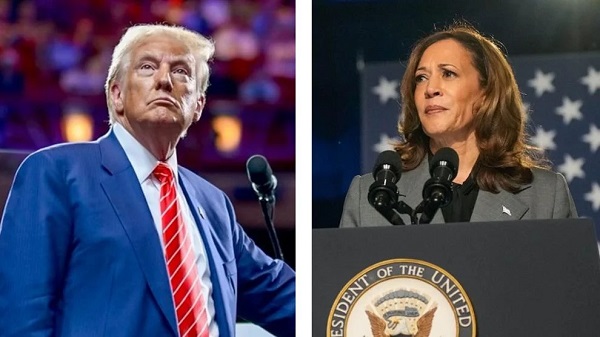From The Center Square
By Casey Harper
Vice President Kamala Harris and former President Donald Trump face off at the ballot box on Tuesday with control of the U.S. Senate and House up for grabs.
This election cycle has featured unusual alliances and demographic shifts not seen in recent elections.
Billionaire Elon Musk joined former Democratic Rep. Tulsi Gabbard and former Democrat Robert F. Kennedy Jr. to endorse Trump this time around.
Meanwhile, Harris has taken to the campaign trail with former Republican U.S. Rep. Liz Cheney, daughter of former Republican Vice President Dick Cheney, meaning the iconic Kennedy and Cheney brands are opposing one another yet again, but from the opposite sides this time around.
Those changes come alongside unusual demographic inroads for Trump while men shift more Republican and women favor Democrats, an apparently widening gap for the two sexes.
Union workers, Hispanic voters, and Black voters are traditionally Democratic-favoring demographics that Trump has managed to curry favor with this election.
“He’s changed the makeup of the Republican coalition, and some of them are formerly Democratic,” campaign veteran and former Mitt Romney spokesperson Ryan Williams told The Center Square. “And if you are in a tight race in a purple state, you want to appeal to those voters and try to get them to split their ticket.”
Polling shows that Harris has about 80% support among Black voters nationally. Former President Barack Obama, Secretary of State Hillary Clinton, and President Joe Biden all managed to get between 90% and 95% support from Black voters.
Trump has marginally increased his support among Black voters and made even better strides among Hispanic voters.
As The Center Square previously reported, Noble Predictive Insights published new polling Tuesday reporting that Harris leads Trump with Black voters 78% to 20% and with Hispanic voters 50% to 45%.
“He’s reminiscent of Bush 2004 numbers,” said Williams, now at Targeted Victory, referring to when former President George W. Bush got 40-44% of the Hispanic vote, depending on which survey or analysis you cite.
“Trump can reach out and connect to these voters in a way that my old boss, Mitt Romney, couldn’t,” Williams continued. “That’s not to say that Republicans are going to win these groups, but they are going to lessen the margin which is why I think that this race is so close at this point.
“You are essentially heading into a dead heat in so many states because Trump has managed to slice into traditionally Democratic constituencies and narrow the margins,” he added.
The demographic realignment has a big impact in down-ballot U.S. House and Senate races with 33 Senate seats in the balance. All 435 House seats are up for reelection every two years.
In the Senate, Democrats are defending about twice as many seats as Republicans, painting a tough picture for the party. Republicans are also considered slight favorites to take the U.S. House, according to betting markets.
Democrats have been working hard to resurrect their relationship with Black voters, with Harris rolling out new policies and even Obama chiding Black men about not voting for Harris.
Last month, Obama told a gathering of Black men to vote for Harris and suggested they would not support her because she was a woman, a comment that sparked pushback and criticism for Democrats.
“Respectfully, President Obama, what you said is not acceptable,” ESPN’s most famous host, Stephen A Smith, who is Black, said on one of his shows after the remarks. “Is it possible that the reason some Black folks may not be inclined to vote or may be a bit disenchanted or dare I say may go as far as voting for Trump, is it possible that it’s policy as opposed to misogyny?
“Inflation, the cost of living, the cost of gas, the cost of groceries, that don’t matter?” he continued. “Immigration and our borders and this belief that there’s an elevated level of sensitivity toward them as opposed to Black folks struggling if not starving in this country? Yes that plays a role too.”















